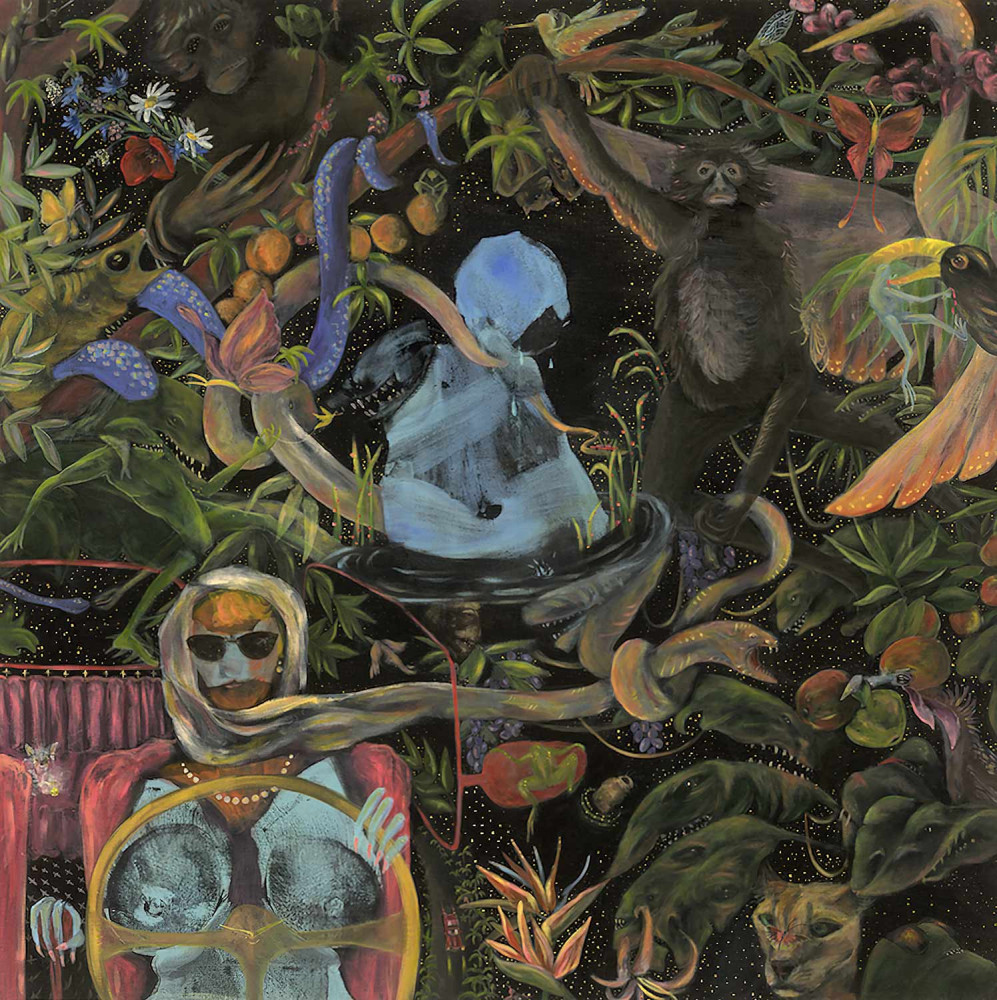As part of the official program of the Sellery Weekend Berlin, SomoS presents What Narcissus Saw, an exhibition of paintings created by Polish painter Emilia Jechna (1994) during her winter/spring 2023 artist residency. Her primary mode of inspiration is drawn from her own body as an artistic tool and a deep engagement with the lore and mythologies that shape us.
Emilia Jechna’s work revolves around world-building as a deeply personal practice, providing her with a secret sanctuary in an environment of her own creation. She initiates this process by first imprinting parts of the body onto the canvas, whether it be her own or others. This initial body printing in the Ives Klein manner amounts to a direct insertion of the young artist’s personal life into the settings she comes to conceive, and from them grows a vast and mythical atmosphere. The building of these environments is purely intuitive, each branch, petal, and piece of fur deriving from her conversation with the work as it comes into focus. Her work relies heavily on spontaneous exchange with each painting through an intentional lack of sketching or preparation. In doing so, each canvas becomes a product of reflective internal dialogue, one which fosters wholeness even despite the busy scenes she depicts:
“I like that I can paint quickly, that I can try different ideas directly on the canvas and wipe them away if they don’t seem right. The greatest brush is my own body. I absolutely love imprinting it on the canvases; it’s like therapy.”
The series developed during her time in Berlin at SomoS takes on a new kind of narrative through her focus on biblical myths and legends. While still utilizing the same practices of imprinting the body, this series detaches Jechna’s emotional intimacy from the work and swaps it for a grander commentary on religious lore’s role for its audiences. As someone previously steeped in religious thought throughout childhood, her current exhibition hopes to utilize universal narratives to reflect upon the culture that framed much of her reality.
The theme of borrowing motifs continues in her adaptation of works by her artistic role models: “I think it also made me ‘quote’ quite a lot of other painters in my works – I realized how many inspirations are in my head and that it’s no sin to use them.” The unabashed presence of outside inspiration is a testament to her ability to merge influence with artistic spontaneity, attempting to link her past with her present. Within this series, Jechna does not indulge in a rejection of her past. Instead, she comes to embrace all aspects of the world that have shaped her current identity as an artist, placing them on display with the hope that viewers will find relief in these worlds of her creation.
“It would be easy to try to reject all of it now and make myself see it all as insignificant nonsense that I was exposed to and indulged in, but I would rather treat it as a beautiful, interesting journey full of doubt, magic and the need of finding my own way of understanding life.”
Looking deeper, it becomes clear that such introspective aspects of Jechna’s art, in fact, cover existential universalities. In developing her paintings, she was inspired by Lou Andreas Salome’s take on Narcissus. The German writer suggests that our antipathy towards him might result from a common misunderstanding of the myth, pointing out that Narcissus wasn’t necessarily laser-focused on himself – instead, when he saw himself in the reflection on the water, he realized he was a fragment of the world that surrounded him. Behind his face was the sky with clouds in various shapes and birds flying above the mountains; trees framed his cheeks, and below his chin, there were blossoming flowers. His excitement came from the realization that he was indeed a piece of the world he had been exploring since the beginning of his life. All of the magic he’s experienced, the beauty he’s seen on Earth, and the unreachable stars he has had the chance to notice – all of this is incomplete without his existence. He finally sees himself not only as a passive observer but as an essential participant in life itself.
In this way, Jechna’s paintings invite us to look beyond our self-reflection and take in the whole picture.

Tid og sted
SomoS Art House
Kottbusser Damm 95, Berlintel. +49(0)1723118431


